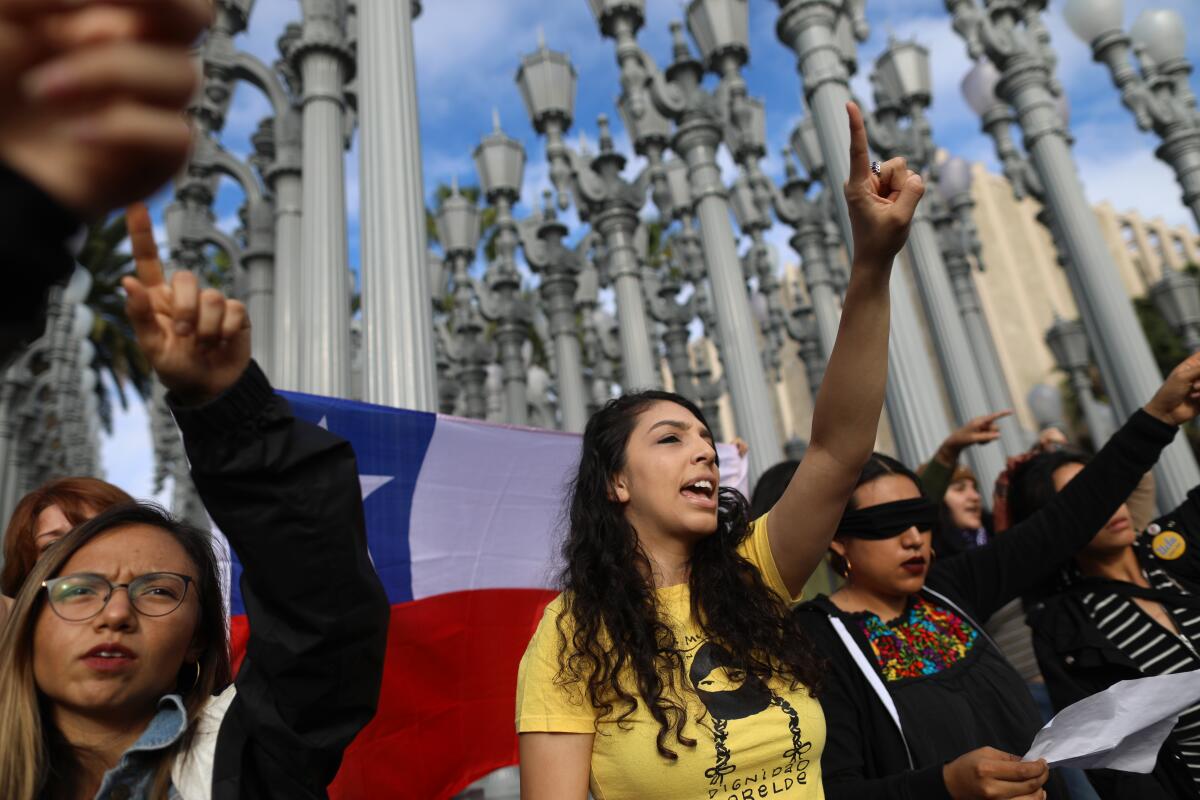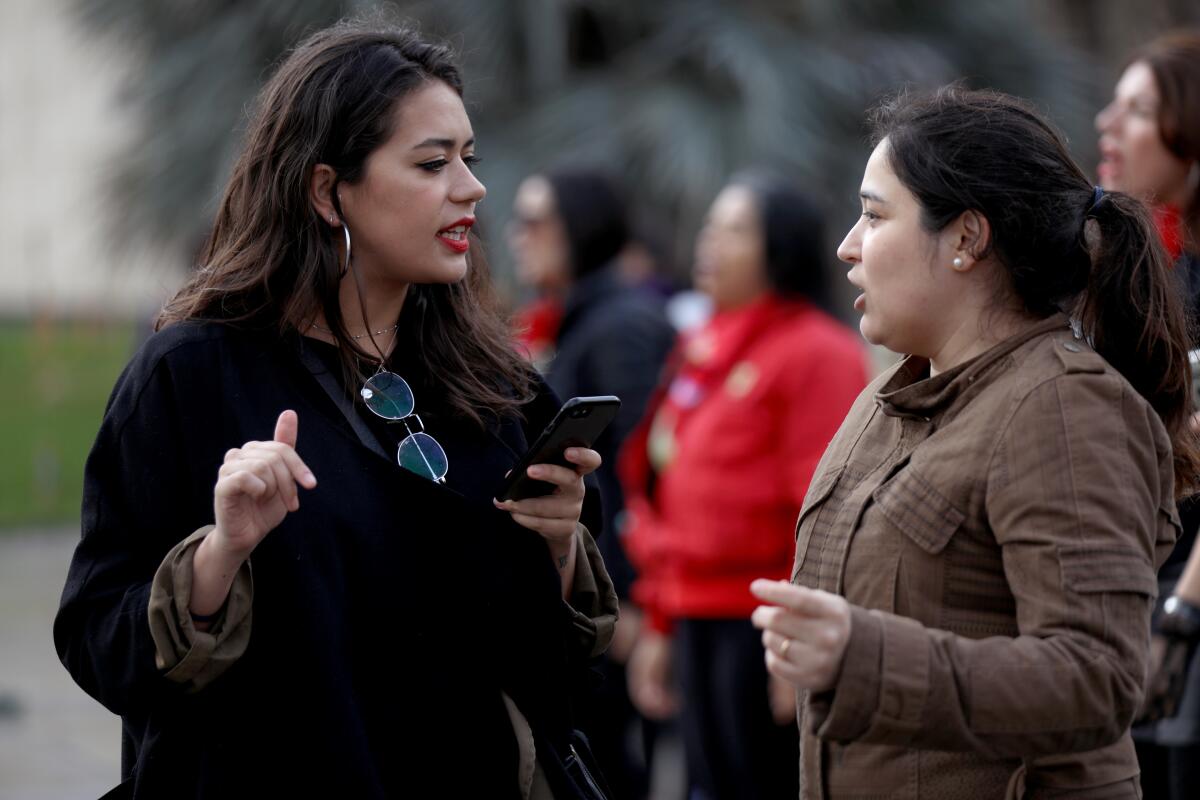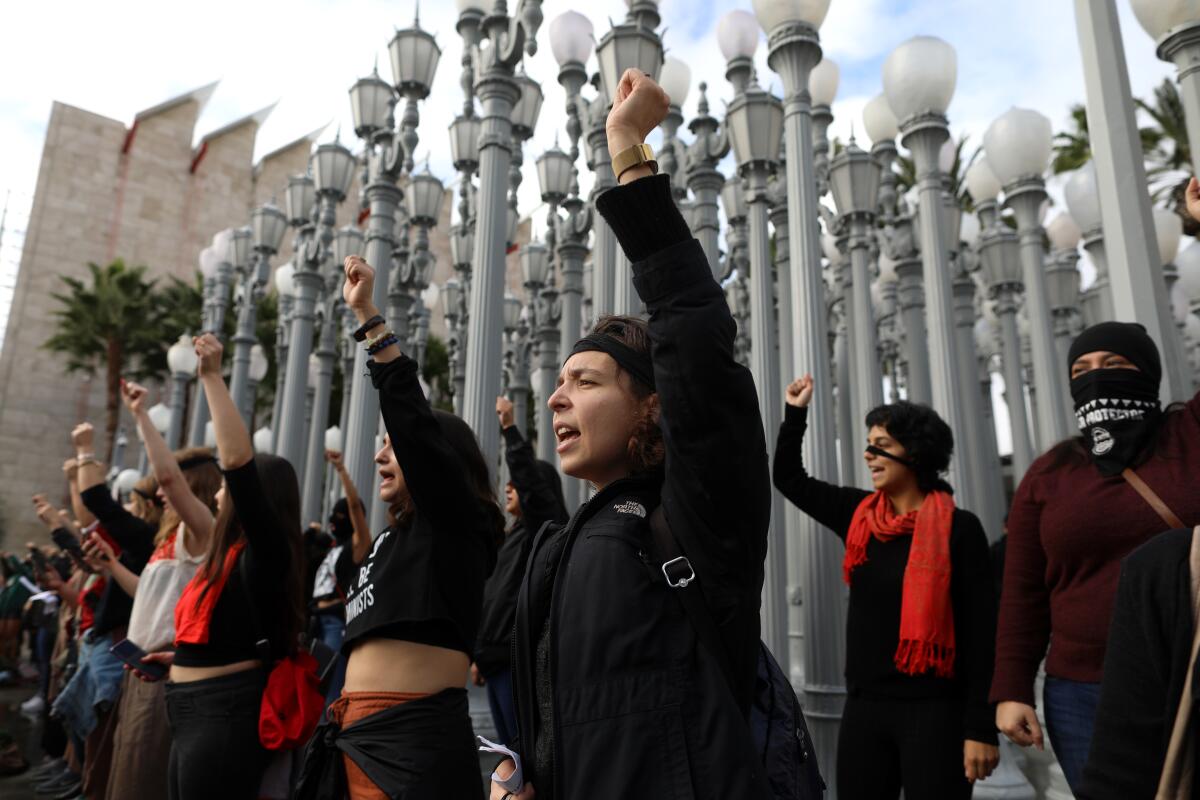How the viral protest ‘A Rapist in Your Path’ became a defiant anthem for 2019

- Share via
It begins with a group of women, usually blindfolded, and an electronic beat. There is a side-to-side shuffle, chanting and squats. And there is the unforgettable chorus, done to a finger-snapping dance: “Y la culpa no era mía / ni dónde estaba / ni cómo vestía.” (And the fault was not mine / nor where I was / nor how I was dressed.)
The action ends with the group pointing straight ahead and repeating the refrain: “El violador eres tú.” (The rapist is you.)
This stirring performance, titled “Un violador en tu camino” (A Rapist in Your Path), was first brought to life by the feminist art collective called Lastesis at a protest in the port city of Valparaíso, Chile, late last month, as a way of drawing attention to violence against women. Since then, this viral action has materialized in Colombia, Mexico, France, India, the U.S. and Turkey (where an attempt to stage it on Sunday was broken up by police).
Naturally, video of the catchy dance and song is all over the internet — tweeted by none other than Rep. Alexandria Ocasio-Cortez (D-N.Y.).
On Sunday, a group of more than 200 women — old, young and in between, with a few school-age girls and a couple of dogs in the mix — gathered on the sidewalk before Chris Burden’s “Urban Light” at the Los Angeles County Museum of Art and performed it again.
For more than an hour, their collective voices, in Spanish, rang clearly amid the din of traffic on Wilshire Boulevard: “Y la culpa no era mía, ni dónde estaba, ni cómo vestía.”
“This intervention, it has really turned into a hymn across women,” said Francisca Valenzuela, a Chilean American singer who turned up at LACMA to participate in the action. “It’s a slogan for dignity.”
Certainly, it’s a performance whose defiance resonates profoundly in an era in which a cursory scan of news headlines can feel like an assault on women and their bodies.

In El Salvador, women are tried for suffering miscarriages. In India, violence against women, including high-profile gang rapes and murders, have brought protesters to the streets. In Mexico, over the last seven years, the legal system has added a new offense to the books: femicide, the killing of a woman for gender-specific reasons.
The United States is no exception. In Ohio, state lawmakers recently introduced an abortion bill that includes a provision requiring all ectopic pregnancies to be reimplanted in the uterus — a medical procedure that doesn’t exist. And, of course, there are the relentless headlines about the late financier Jeffrey Epstein‘s grotesque proclivities for young girls.
All of this accounts for why this short and eminently sticky political action from Chile has become a worldwide phenomenon.
“There is a defiance,” said independent curator Cecilia Fajardo-Hill, who helped organize the Hammer Museum exhibition “Radical Women: Latin American Art, 1960-1985” in 2017. “It can’t just be ‘turn the other cheek.’ This is a war chant.”
“You just need a body and a voice,” said Inger Flem, a Chilean graduate student in Los Angeles who helped organize the action at LACMA. “It can be repeated anywhere with anyone. It lets itself be part of the people.”
The LACMA performance is not likely to be the last in Los Angeles. Students at Cal State Long Beach planned to perform the piece on campus on Tuesday afternoon.

Finding the state complicit
“Un violador en tu camino” was originally devised by four Chilean artists from Valparaíso — Daffne Valdés, Sibila Sotomayor, Paula Cometa Stange and Lea Cáceres — collectively known as Lastesis, a name that nods to the group’s interest in promoting tesis (theses) by important feminist thinkers.
This particular performance drew from work by Argentine feminist anthropologist Rita Segato‘s pioneering studies on rape. It also was inspired by some grim statistics related to sexual assault in Chile, where only 8% of resolved sexual-assault cases in 2018 ended up in some sort of conviction against the perpetrator, according to government statistics compiled by the Chilean Network Against Violence Against Women.
Caroline Delgado, an L.A.-based Chilean business student who was one of the organizers of Sunday’s action at LACMA, said the piece ultimately speaks to the ways in which “women in Chile have been abused, not only by men but by the structure, by the state.”
And that is part of what is so striking about Lastesis’ action. It doesn’t simply call for an end to violence against women. It calls out the state infrastructures that belittle sexual assaults (in India, cops recently asked the parents of a murdered gang-rape victim if she was having an affair) and also regularly fail to prosecute crimes of sexual violence in a meaningful way. (An egregious case in point: Epstein was not only allowed on work release while serving his original jail sentence but may also have arranged additional trysts with girls during that time.)
“It’s the cops / The judges / The state / The president,” goes one memorable line from “Un violador,” as the performers point accusingly. They too are complicit.
“The guilt, the pain, the humiliation and the moral embarrassment should be felt by the abusers and not by women whose bodies have been violated,” the artists told Spanish daily El País in an interview last week. (Lastesis could not be reached for comment.) “That is the most important thing that is being generated.”
Lastesis’ choreography, in a few simple actions, highlights other issues of justice too. Participants blindfold themselves as a nod to the Chilean protesters who have been blinded by police during the recent protest there. They squat as a way of highlighting the demeaning gesture that nude women are required to do while undergoing imprisonment. All of it is far more confrontational than some adorable pink pussy hat.
“It’s so defiant,” said Monica Olivares, a nurse who participated in the LACMA event on Sunday. “This is something that we’ve been missing. We’ve been hit, we’ve been abused, we’ve been raped. I had to come.”
There is a defiance. It can’t just be ‘turn the other cheek.’ This is a war chant.
— Cecilia Fajardo-Hill, independent curator
Rebecca Hernandez, a Mexicali, Mexico-born choreographer who has studied the ways in which protest movements use choreography and other signifiers to send messages, said the protest has spread effectively because it gives women the collective safety of speaking their concerns.
“For women in unison to have this body-based event where they are saying something meaningful,” she said. “Even if you are not a survivor, you know what it means to be walking down a street where you don’t feel safe, so this is very empowering.”

Fajardo-Hill, who has studied feminist art throughout Latin America, says it’s all part of a long tradition of women taking to performance as a way of making a statement, in the process blurring the line between art and politics.
“Think of the Madres of the Plaza de Mayo,” she said, referring to the mothers of the disappeared who gathered for vigils in white headscarves in front of the Argentine presidential palace in the 1970s and ’80s. “That image is still ingrained in our minds. Images of them have been used again and again in art exhibitions to show what it means for women to fight and mourn injustice.”
Lastesis have created a new image for 2019: a woman pointing right at the source of her pain.
“That’s the battle for women now,” says Fajardo-Hill. “It’s for our bodies.”
More to Read
The biggest entertainment stories
Get our big stories about Hollywood, film, television, music, arts, culture and more right in your inbox as soon as they publish.
You may occasionally receive promotional content from the Los Angeles Times.











